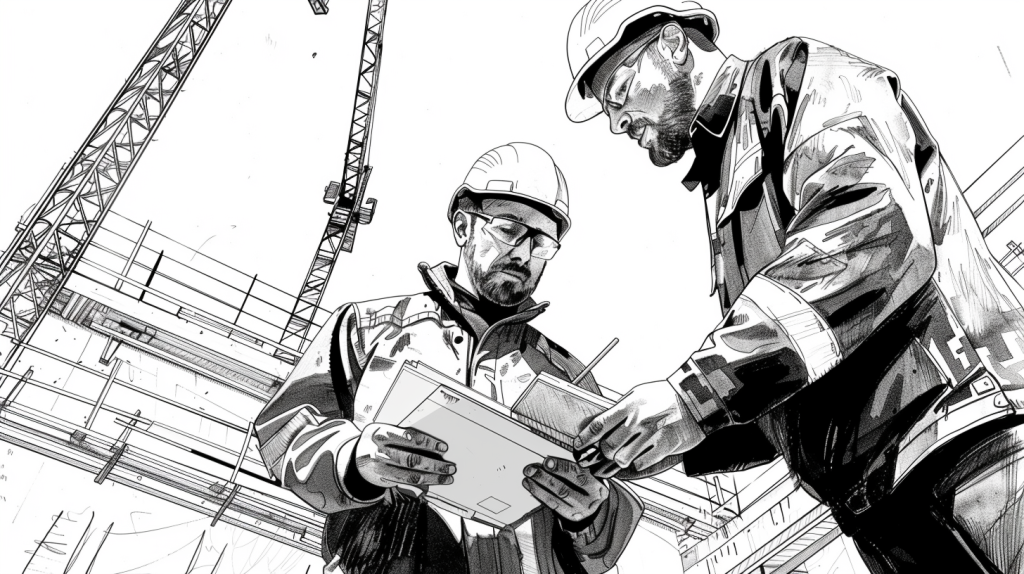Optimizing Construction Bid Management: Strategies, Tools, and Practical Implementation for the Commercial Construction Industry
Table of Contents:
Dive into the ultimate guide to effective bid management in construction. Discover key strategies, tools, and real-world applications that project managers can use to streamline the bidding process, improve accuracy, and win more contracts.

In the competitive construction industry, mastering bid management is crucial for securing new projects and driving business growth. Efficient bid management involves creating accurate, compelling bids that stand out to clients and stakeholders, ultimately increasing your chances of winning contracts.
This guide provides an in-depth look at key strategies, essential tools, and practical implementations that construction managers can use to streamline the bidding process, improve accuracy, and achieve maximum effectiveness. Whether you’re a seasoned professional or new to bid management, these insights will help you refine your approach and enhance your success rate.
The Importance of Effective Bid Management in Construction
Securing New Contracts
Winning bids is fundamental to securing new contracts in the construction industry. Effective bid management ensures that your proposals are comprehensive, competitive, and aligned with client requirements, giving you a significant edge over competitors.
For instance, a well-prepared bid that clearly articulates your company’s capabilities, experience, and value proposition can make a strong impression on potential clients. This level of professionalism can set you apart in a crowded marketplace.
Enhancing Financial Stability
Consistently winning bids leads to a steady stream of projects and revenue, which enhances your company’s financial stability. Effective bid management helps you maximize your chances of securing contracts, contributing to overall business growth and profitability.
For example, integrating bid management tools with financial management software allows you to track the financial implications of bids in real-time, ensuring accurate forecasting and budgeting.
Building Reputation and Trust
Submitting high-quality bids consistently builds your company’s reputation and fosters trust with clients and stakeholders. A strong track record of winning bids and delivering successful projects positions your company as a reliable and competent partner in the construction industry.
Key Strategies for Effective Bid Management
Developing a Comprehensive Bid Strategy
Planning and Research
A comprehensive bid strategy is essential for effective bid management. This strategy should involve thorough planning and research to ensure that your bids are tailored to meet client needs and project requirements.
For example, researching the client’s background, understanding the project scope, and identifying key differentiators that set your company apart can help you create a more compelling bid. This preparation ensures that your proposals are aligned with client expectations and industry standards.
Utilizing Bid Management Tools
Streamlining the Process
Utilizing bid management tools can significantly enhance the efficiency and accuracy of your bid management process. These tools offer features such as bid tracking, document management, and analytics, ensuring that all aspects of your bids are managed systematically.
For instance, platforms like StruxHub provide comprehensive bid management solutions that streamline the entire process. These tools enable construction managers to track bids from creation to submission, ensuring that all documents are organized and accessible.
Creating Detailed and Accurate Bids
Enhancing Proposal Quality
Creating detailed and accurate bids is crucial for winning projects. Your proposals should clearly outline your capabilities, experience, and approach, providing clients with all the information they need to make an informed decision.
For example, including detailed project timelines, cost estimates, and resource allocations in your bids demonstrates your thorough understanding of the project requirements. This attention to detail reassures clients that you are well-prepared and capable of delivering the project successfully.
Conducting Thorough Bid Analysis
Learning from Past Bids
Conducting thorough bid analysis helps you evaluate the performance of your bids and identify areas for improvement. Analyzing past bids provides insights into what worked well and what could be enhanced, allowing you to refine your approach for future bids.
For instance, reviewing client feedback on previous bids can provide valuable insights into their preferences and priorities. This information can help you tailor your bids more effectively, increasing your chances of winning future projects.
Essential Tools for Bid Management in Construction

StruxHub
Experience the power of StruxHub today and witness firsthand how it can revolutionize your construction operations.
Bid Management Software
Streamlining the Process
Bid management software is a vital tool for streamlining the bid management process. These platforms offer features such as bid tracking, document management, and analytics, ensuring that all aspects of your bids are managed systematically.
For instance, StruxHub’s bid management features provide a centralized platform for tracking and managing bids. This software allows construction managers to create, track, and analyze bids efficiently, ensuring that all documents are organized and accessible.
Project Management Software
Enhancing Coordination and Collaboration
Project management software provides a comprehensive solution for managing all aspects of a construction project, including bid management. These platforms offer features such as task management, document sharing, and real-time communication, enhancing coordination and collaboration among project teams.
For example, integrating bid management tools with project management software ensures that all bids are reflected in the overall project plan. This integration allows construction managers to track the impact of bids on the project scope, schedule, and budget, ensuring that all bids are managed consistently.
Document Management Systems
Organizing Bid Documents
Document management systems are essential for organizing and managing bid documents. These systems provide a centralized repository for storing and accessing bid documents, ensuring that all information is organized and easily accessible.
For instance, using a document management system allows construction managers to store all bid documents in a centralized location, making it easy to retrieve and review documents as needed. This organization helps ensure that all bid documents are accurate and up-to-date.
Analytics Tools
Evaluating Bid Performance
Analytics tools are crucial for evaluating the performance of your bids and identifying areas for improvement. These tools provide insights into bid success rates, client feedback, and other key metrics, helping you refine your bid management process.
For example, using analytics tools to review the success rates of past bids can help you identify patterns and trends. This information can inform your bid strategy, allowing you to make data-driven decisions that enhance your chances of winning projects.
Practical Implementation of Bid Management Strategies
Enhancing Project Efficiency with StruxHub
StruxHub’s comprehensive bid management features have been instrumental in enhancing project efficiency for numerous construction projects. By providing real-time tracking, document management, and analytics, StruxHub enables construction managers to manage bids efficiently and transparently.
Streamlining Financial Management
Integrating bid management tools with accounting and financial management software helps streamline financial management and ensure that all financial changes are accurately tracked. For instance, a construction company using StruxHub’s bid management features can integrate the software with QuickBooks to track the financial impact of bids in real-time.
Improving Communication and Collaboration
Collaborative project management software facilitates transparent communication and collaboration among all stakeholders. For example, using StruxHub allows stakeholders to review and approve bids online, ensuring that all bids are implemented quickly and efficiently.
Top 12 Tips for Mastering Bid Management in Construction

1. Develop a Comprehensive Bid Strategy
Create a detailed bid strategy that includes planning, research, and preparation to ensure that your bids are competitive and aligned with the client’s requirements.
2. Use Bid Management Software
Implement dedicated bid management software to streamline the bid management process. Tools like StruxHub offer features such as bid tracking, document management, and analytics.
3. Create Detailed and Accurate Bids
Ensure that your bids are detailed and accurate, clearly outlining your capabilities, experience, and proposed approach. Include project timelines, cost estimates, and resource allocations.
4. Conduct Thorough Bid Analysis
Review and analyze past bids to understand what worked well and identify areas for improvement. Use this information to refine your approach for future bids.
5. Integrate with Project Management Tools
Integrate bid management tools with project management software to ensure that all bids are reflected in the overall project plan. This integration enhances coordination and collaboration.
6. Monitor Financial Impacts
Track the financial impact of bids by integrating bid management tools with accounting software. This integration ensures that all financial changes are accurately reflected in the project budget.
7. Provide Ongoing Training
Offer regular training sessions on the bid management process and the use of bid management tools. Ensure that all team members are familiar with the tools and processes.
8. Encourage Stakeholder Involvement
Involve all stakeholders in the bid management process to foster collaboration and transparency. Use collaborative project management software to facilitate real-time communication and online approvals.
9. Organize Bid Documents
Use document management systems to organize and manage bid documents. Ensure that all information is organized and easily accessible.
10. Implement Automated Workflows
Use automated workflows to streamline the bid management process, reducing manual intervention and ensuring that all steps are followed consistently.
11. Communicate Clearly
Maintain clear and transparent communication with all stakeholders about bids. Ensure that everyone understands the implications and agrees on the best course of action.
12. Foster a Culture of Excellence
Encourage a culture of excellence within your team, focusing on quality and professionalism in all aspects of bid management. This mindset helps ensure that bids are created, tracked, and analyzed effectively.
Unlocking Bid Management Success in Construction
Mastering bid management in construction is crucial for securing contracts, enhancing financial stability, and building a strong reputation. By implementing comprehensive strategies, utilizing advanced tools, and continuously refining your approach, you can streamline your bid management process, improve accuracy, and win more contracts. StruxHub offers powerful solutions to help you achieve these goals, providing the tools and insights needed to optimize your bid management practices and ensure project success.
StruxHub enhances efficiency and coordination across all project phases, providing a single source of truth that eliminates silos and fosters collaboration. Real-time updates, financial management tools, and seamless commvunication features ensure that all team members and stakeholders are aligned and informed, reducing the risk of errors and delays. With comprehensive solutions for document management, risk mitigation, and quality control, StruxHub maintains project integrity and safety, while mobile access and integration capabilities further enhance project flexibility and efficiency.
StruxHub’s Key Features and Benefits:
- Advanced Delivery Management: Automate and optimize your delivery schedules, ensuring materials arrive just in time, every time.
- Site Communication: Utilize georeferenced maps and instant messaging to keep every team member informed and aligned.
- Construction Materials Management: Track inventory levels and manage materials procurement with ease, reducing waste and avoiding project delays.
- Construction Safety & Inspection Workflows: Implement customizable mobile forms for conducting safety inspections and managing compliance documentation effortlessly.
- Short-Term Scheduling: Visualize project tasks with detailed floor plans, linking each activity to specific locations for better planning accuracy.
- Construction Resource Management: Efficiently allocate personnel and equipment, maximizing productivity and reducing idle time.
StruxHub’s Product Offering:
- StruxHub Deliveries: Simplifies the coordination of incoming deliveries, ensuring materials and equipment are precisely timed to project needs.
- StruxHub Logistics: Offers intelligent site logistics planning, from crane scheduling to space allocation, for smoother operations.
- StruxHub Safety: Elevates on-site safety standards with easy-to-use tools for inspections, permits, and incident reporting.
- StruxHub Scheduling: Enhances project timelines with intuitive scheduling tools that ensure tasks are completed efficiently and on time.
With StruxHub, construction companies can look forward to a streamlined, more efficient project execution that delivers on time and within budget. Embrace the power of innovation and take your construction projects to the next level.
Don’t miss out on the opportunity to optimize your construction management processes with StruxHub. Sign up for a free demo today. Let’s build smarter, together.

StruxHub: Revolutionizing Project Management in Large Commercial Construction
Related Articles
Top 10 Best Practices for Superintendents in Construction Project Management Software
Enhancing High-Rise Construction Efficiency: Navigating with GPS and Project Management Software
The Ultimate Guide to the Best Communication Apps for Teams for Large Scale Commercial Construction
Top 10 Reasons Why You Should Limit the Number of Access Points at Your Construction Site
Best Digital Communication Tools for Large-scale Construction Projects
FAQ
1. How do bid management tools improve project outcomes in construction?
Bid management tools improve project outcomes in construction by streamlining the entire bid process, enhancing accuracy, and fostering better communication and collaboration. These tools provide a centralized platform where all bid-related activities can be managed efficiently, from the initial creation to the final submission.
For example, bid management tools like StruxHub offer features such as automated workflows, real-time tracking, and integrated documentation. This ensures that every step of the bid process is followed consistently, reducing the chances of errors and omissions. Real-time tracking helps project managers monitor the status of bids and make timely adjustments if needed. Integrated documentation ensures that all necessary documents are organized and easily accessible, making the review process smoother and more efficient.
Moreover, these tools enhance communication and collaboration among all stakeholders involved in the bidding process. By providing a single platform where stakeholders can review, comment, and approve bids, bid management tools facilitate better coordination and quicker decision-making. This collaborative approach not only improves the quality of the bids but also increases the likelihood of winning contracts.
2. What are the key features of effective bid management tools in construction?
Effective bid management tools in construction should offer several key features to streamline the bid process and enhance overall project management. Some of the essential features include:
- Automated Workflows: Automated workflows ensure that the bid process follows a consistent path from creation to submission. This reduces manual intervention, minimizes errors, and saves time.
- Real-Time Tracking: Real-time tracking allows project managers to monitor the status of bids continuously. This feature helps identify any bottlenecks or delays early on, allowing for prompt corrective action.
- Integrated Documentation: Integrated documentation ensures that all bid-related documents are stored in a centralized location. This makes it easy to retrieve and review documents, ensuring that nothing is missed.
- Analytics and Reporting: Analytics tools provide insights into bid performance, helping project managers understand what works and what doesn’t. Reporting features can generate detailed reports on bid success rates, client feedback, and other key metrics.
- Collaboration Tools: Collaboration tools facilitate communication among all stakeholders involved in the bidding process. Features like real-time commenting, document sharing, and online approvals ensure that everyone is on the same page.
- Integration with Other Systems: Effective bid management tools should integrate seamlessly with project management and accounting software. This ensures that all bid-related data is reflected in the overall project plan and financial reports.
3. How can construction teams effectively implement bid management tools?
Construction teams can effectively implement bid management tools by following a few best practices:
- Choose the Right Tool: Select a bid management tool that offers the features and functionality that align with your team’s needs. Consider factors like ease of use, scalability, and integration capabilities.
- Provide Training: Ensure that all team members receive adequate training on how to use the bid management tool. Training sessions should cover all aspects of the tool, from creating and submitting bids to tracking and analyzing performance.
- Integrate with Existing Systems: Integrate the bid management tool with your existing project management and accounting systems. This ensures that all bid-related data is reflected in the overall project plan and financial reports.
- Encourage Collaboration: Foster a collaborative approach to bid management by encouraging all stakeholders to use the tool for reviewing, commenting, and approving bids. This ensures that everyone is involved in the decision-making process.
- Monitor and Review: Regularly monitor the performance of your bid management tool and review feedback from users. Use this information to make necessary adjustments and improvements to your bid management process.
4. What best practices should construction teams follow to manage bids effectively?
To manage bids effectively, construction teams should follow these best practices:
- Develop a Comprehensive Bid Strategy: Create a detailed bid strategy that includes planning, research, and preparation. Ensure that your bids are competitive and aligned with the client’s requirements.
- Create Detailed and Accurate Bids: Ensure that your bids are thorough and accurate. Include detailed project timelines, cost estimates, and resource allocations to demonstrate your understanding of the project requirements.
- Conduct Thorough Bid Analysis: Review and analyze past bids to understand what worked well and identify areas for improvement. Use this information to refine your approach for future bids.
- Use Bid Management Software: Implement dedicated bid management software to streamline the bid management process. Tools like StruxHub offer features such as bid tracking, document management, and analytics.
- Integrate with Project Management Tools: Ensure that all bids are reflected in the overall project plan by integrating bid management tools with project management software. This enhances coordination and collaboration.
- Organize Bid Documents: Use document management systems to organize and manage bid documents. Ensure that all information is organized and easily accessible.
- Implement Automated Workflows: Use automated workflows to streamline the bid management process, reducing manual intervention and ensuring that all steps are followed consistently.
- Communicate Clearly: Maintain clear and transparent communication with all stakeholders about bids. Ensure that everyone understands the implications and agrees on the best course of action.
- Foster a Culture of Excellence: Encourage a culture of excellence within your team, focusing on quality and professionalism in all aspects of bid management. This mindset helps ensure that bids are created, tracked, and analyzed effectively.



